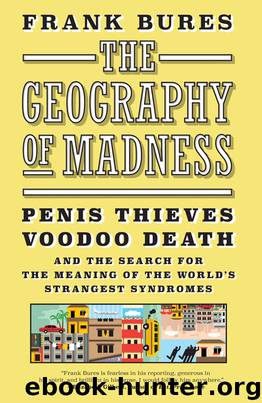The Geography of Madness by Frank Bures

Author:Frank Bures [Bures, Frank]
Language: eng
Format: epub
ISBN: 978-1-61219-373-1
Publisher: Melville House
Published: 2016-04-25T16:00:00+00:00
One day in Minneapolis I met a young Hmong woman named Sandy’Ci Moua, who’d been featured in a local news story about a new generation of Hmong shamans.181 Moua was born in Minnesota, but grew up surrounded by Hmong language and culture; when she first got to college, she would eat the food off her white friends’ plates because she thought everyone ate family style. She is a performance artist and works for the city of Brooklyn Park as a community liaison.
Moua went to a Christian church for years. But whenever she found herself at a Hmong funeral home, she would see spirits and talk to them. Other times, she would see deceased people. Her family had a history of mental illness, but that same family included a long line of shamans: both men and women. So she started pursuing that path, only to leave it for complicated reasons (including the realization, as she put it, that shamanism was based more in fear than love). When I met her, she called herself “spiritually homeless.” I told her I wanted to know if people today still saw the dab tsog at night.
“Everyone has heard stories,” she says. “They want to know, ‘What happens? What do you do?’ It happened to me once. You just turn on your side really quick. There is a Hmong Ghost Story page on Facebook. They talk about it incessantly.”
“And does it still kill people?” I asked.
“I don’t think so. I haven’t heard about it. But I don’t really ask that many questions about it.”
We talked about many things, about how much had changed for the Hmong people in their forty years in America, about how Moua switches codes when talking to young and old people in the Hmong community.
“The luxury for the third generation,” Moua said, “is that they can just be themselves all the time, and not worry about what they are, and what they wear. They have the ability to shape their own narrative more, and not feel the pressure to judge it or qualify it as this or that. When I was growing up, I was called ‘whitewashed’ and I was called ‘fresh off the boat’ at the same time! Two completely opposite insults. But I don’t think they say that much anymore.”
Moua told me she worries that when the older generation dies, they will take many things with them, like the traditional wedding rituals, with their intricate, lyrical language.
“I try to tell myself that it’s not helpful for me to have anxiety about it. I’m just going to ride the wave. Old cultures die and new cultures emerge. That’s the way life is. I can’t control it. It’s not up to me. But I wish there was a book that said, ‘When in doubt, go to page five.’
“But there is no book. We’re not a text-based culture. We learn through stories. We just absorb it. But we don’t know all the words. We don’t know what to do. And if we don’t know it, we can’t be bound by it.
Download
This site does not store any files on its server. We only index and link to content provided by other sites. Please contact the content providers to delete copyright contents if any and email us, we'll remove relevant links or contents immediately.
Autoboyography by Christina Lauren(4670)
Asking the Right Questions: A Guide to Critical Thinking by M. Neil Browne & Stuart M. Keeley(4567)
Dialogue by Robert McKee(3577)
Eat That Frog! by Brian Tracy(3509)
Sticky Fingers by Joe Hagan(3451)
Journeys Out of the Body by Robert Monroe(2980)
Elements of Style 2017 by Richard De A'Morelli(2940)
Annapurna by Maurice Herzog(2834)
Schaum's Quick Guide to Writing Great Short Stories by Margaret Lucke(2797)
Full Circle by Michael Palin(2764)
The Diviners by Libba Bray(2438)
The Art of Dramatic Writing: Its Basis in the Creative Interpretation of Human Motives by Egri Lajos(2410)
The Mental Game of Writing: How to Overcome Obstacles, Stay Creative and Productive, and Free Your Mind for Success by James Scott Bell(2389)
Why I Write by George Orwell(2355)
Atlas Obscura by Joshua Foer(2349)
In Patagonia by Bruce Chatwin(2263)
The Fight by Norman Mailer(2154)
The Elements of Style by William Strunk and E. B. White(2074)
Venice by Jan Morris(2048)
